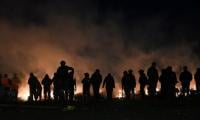Iran, Italy sign 17 bn euros deals
Rouhani says regional problems should be resolved through talks, not military
ROME: Generating economic growth in the Middle East is crucial to defeating extremism, Iranian President Hassan Rouhani said on Tuesday, putting forward his country as a regional trade hub and pillar of stability.
Rouhani is on a four-day trip to Italy and France, looking to rebuild Iranian relations with the West some two weeks after financial sanctions on Tehran were rolled back following the implementation of its nuclear deal with world powers.
Italy announced some 17 billion euros ($18.4 billion) of business deals with Iran on Monday. Mega contracts are also in the offing in France, reflecting EU countries´ keenness to cash in on the diplomatic thaw with the Islamic Republic.
Underscoring the growing warmth, Rouhani said he expected Italian Prime Minister Matteo Renzi to visit Iran in the coming months to help boost bilateral economic alliances. "We are ready to welcome investment, welcome technology and create a new export market," Rouhani told a business forum on the second day of his visit to Rome, saying Iran had ambitions to develop its own economy after years of curbs and hardship.
"Under the new conditions, we want to export 30 percent of what we produce in Iran," he said, calling for rapid investment in "the most secure and stable country in the region".
Italy has rolled out the red carpet to Rouhani and his 120-strong delegation of business leaders and government ministers, seeing Tehran as a possible partner in the battle against the Islamic State. "If we want to combat extremism in the world, if we want to fight terror, one of the roads before us is providing growth and jobs. Lack of growth creates forces for terrorism. Unemployment creates soldiers for terrorists," Rouhani said. He said the regional issues should be resolved through negotiations, not through the military.
Later, during a 40-minute private meeting in Pope Francis´s private study, the pontiff asked Rouhani to help fight the spread of terrorism and arms trafficking, and to promote peace, according to a Vatican statement.
Many Western nations accuse Iran of funding various militant groups that are on US and EU terror blacklists. Despite Iran's deal with world powers to curb its disputed nuclear programme, the United States is keeping some of its financial sanctions in place because of its links to organisations such as Hezbollah. Any such criticism has barely been heard in Rome, with the government eager to welcome Iran as a potentially positive force in an increasingly fragmented Middle East.
"We are not looking at simple reactivation of our cooperation with Iran, but rather a comprehensive re-launch of a strategic alliance," Italian Foreign Minister Paolo Gentiloni told the business conference.
To make sure the leader of the Islamic Republic would not be offended, the Italians even covered nude Roman statues in the Capitoline Museums where Rouhani met and spoke with Renzi on Monday evening.
Among the deals signed on Monday were a $4 billion contract for oil services group Saipem, up to 5.7 billion euros in contracts for steel firm Danieli, up to 4 billion euros of business for infrastructure firm Condotte d´Acqua, 4 billion euros for rail and road company Gavio and 400 million euros for planes from Finmeccanica.
Industry Minister Federica Guidi told la Repubblica newspaper that the total value of the contracts could exceed the 17 billion euros initially indicated by the government.
Two large Italian business delegations went to Tehran soon after the nuclear deal was inked last year. Another such group is scheduled to visit Iran from Feb.8 to 10.
-
 'Bridgerton' Season 4: Showrunner Talks About Violet's Steamy Romance
'Bridgerton' Season 4: Showrunner Talks About Violet's Steamy Romance -
 John Tesh Recalls ‘uncomfortable’ Backlash Over ’70s Romance With Oprah Winfrey
John Tesh Recalls ‘uncomfortable’ Backlash Over ’70s Romance With Oprah Winfrey -
 Meghan Markle, Prince Harry Problem Was Not ‘work’ During Time With Royals
Meghan Markle, Prince Harry Problem Was Not ‘work’ During Time With Royals -
 Meta Strikes Multi-billion-dollar AI Chip Deal With Google: Will The New Collaboration Pay Off?
Meta Strikes Multi-billion-dollar AI Chip Deal With Google: Will The New Collaboration Pay Off? -
 Gracie Abrams Breaks Silence After Losing 2026 BRIT Award
Gracie Abrams Breaks Silence After Losing 2026 BRIT Award -
 Deon Cole Takes Swipe At Nicki Minaj In Mock Prayer During NAACP Image Awards Monologue
Deon Cole Takes Swipe At Nicki Minaj In Mock Prayer During NAACP Image Awards Monologue -
 Jennifer Garner Reveals The Actress Who 'carried Through Things'
Jennifer Garner Reveals The Actress Who 'carried Through Things' -
 Shamed Andrew ‘awful’ Time As Trade Envoy Is Laid Bare By Insider
Shamed Andrew ‘awful’ Time As Trade Envoy Is Laid Bare By Insider -
 Belgium Seizes Suspected Russian Shadow Fleet Tanker
Belgium Seizes Suspected Russian Shadow Fleet Tanker -
 Liza Minelli Makes Bombshell Claim About Late Mother Judy Garland’s Struggle With Drugs
Liza Minelli Makes Bombshell Claim About Late Mother Judy Garland’s Struggle With Drugs -
 Shipping Giant Maersk Halts Suez Canal, Bab El-Mandeb Sailings Amid Escalating Conflict
Shipping Giant Maersk Halts Suez Canal, Bab El-Mandeb Sailings Amid Escalating Conflict -
 Matthew McCoughaney Reveals One 'gift' He Achieved With Losing Nearly 50 Pounds
Matthew McCoughaney Reveals One 'gift' He Achieved With Losing Nearly 50 Pounds -
 'Scream 7' Breaks Box Office Record Of Slasher Franchise: 'We Are Grateful'
'Scream 7' Breaks Box Office Record Of Slasher Franchise: 'We Are Grateful' -
 Bolivian Military Plane Crash Death Toll Rises To 20
Bolivian Military Plane Crash Death Toll Rises To 20 -
 'Sinners' Star Blasts Major Media Company For 2026 BAFTAs Incident
'Sinners' Star Blasts Major Media Company For 2026 BAFTAs Incident -
 Inside Scooter Braun, Sydney Sweeney's Plans To Settle Down, Have A Baby
Inside Scooter Braun, Sydney Sweeney's Plans To Settle Down, Have A Baby



